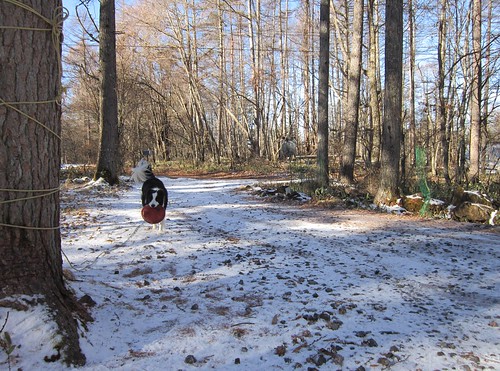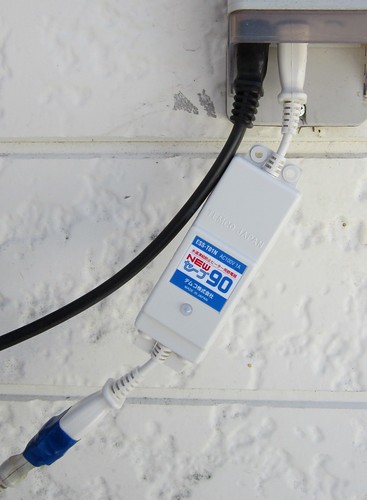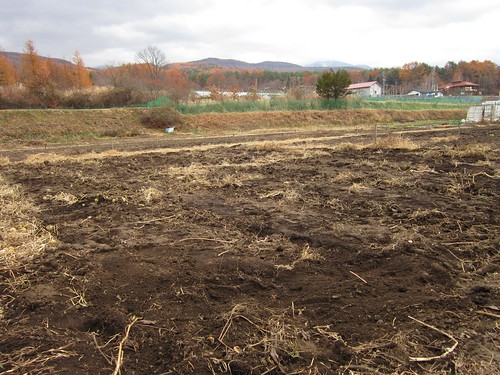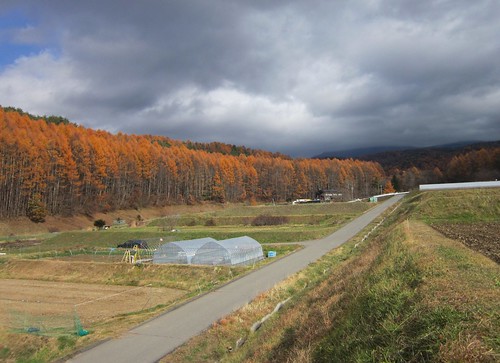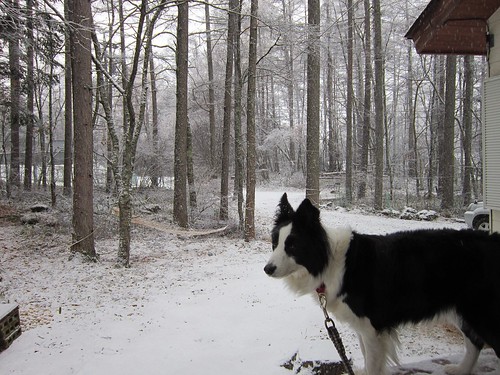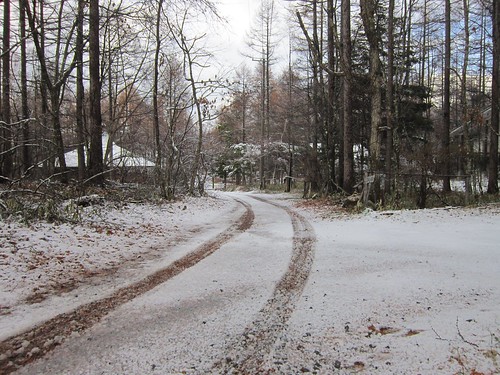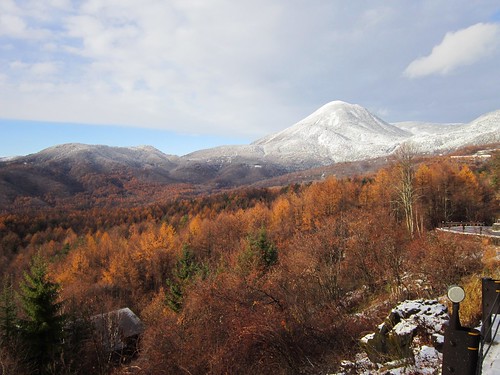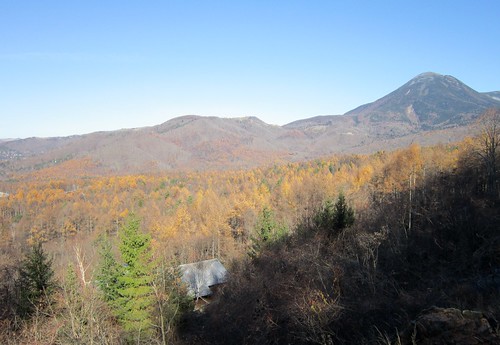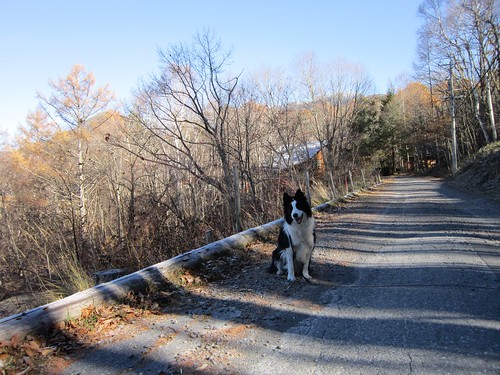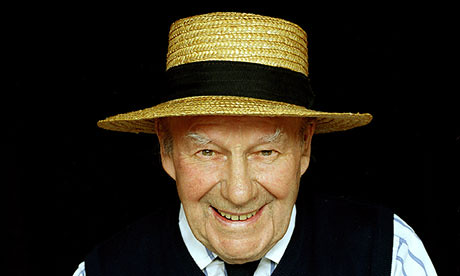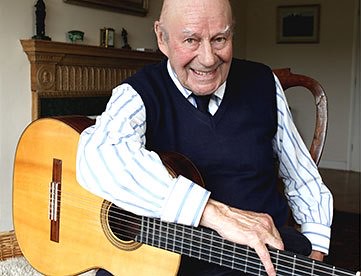昨日は昼間の最高気温が氷点下0.5度と今シーズン初めての「真冬日」となり、そして、今朝の最低気温は氷点下10度で、今シーズンの最低気温となりました。11月なのに早々と冬の気温です。しかし、午後は少し寒さがゆるんできました。
3日前、27日(水)の夜に少し雪が降り、その後も気温があまり上がらなかったために、我が家の庭にはまだ雪が残っています。散歩に出掛ける前に、ランディはアプローチでフリスビー遊びをするのが楽しみですが、このところ白いアプローチ上でのフリスビーです。
ランディとの散歩道からは、落葉してしまった蓼科高原の向こうに白い雪を冠った蓼科山がきれいです。
気温が低いと空気が引き締まって、澄んでいるため、東急蓼科高原別荘地とその向こうの車山高原、更にその向こうの乗鞍岳(左から)、穂高岳、槍ヶ岳などの北アルプスがよく見えました。
西には木曾御嶽山がくっきりと立派な姿を見せていました。
2013年11月30日土曜日
2013年11月27日水曜日
水道凍結防止ヒーター用節電器 NEWセーブ90
高原の山荘では、水道管は、冬に水抜き・水通しがしやすいように、壁の外側に設置されていて、また、凍結し、破裂しないように水道管には凍結防止ヒーターが巻かれています。冬の間、この凍結防止ヒーターを動かす電気代はばかになりません。そして、最近は凍結防止ヒーターを節電するための器具もいろいろ売られているようです。
2012年12月~2013年4月の間の電気代 83,088円 ・・・ 『NEWセーブ90』設置後
2011年12月~2012年4月 〃 104,122円 ・・・ 〃 設置前
節約分 21,034円
月平均 4,207円
去年11月末に設置したために11月分は算入されていません。11月も凍結防止ヒーターは稼働しますので、11月も加えれば、我が家のワン・シーズンの電気代の節約は約25,000円になります。
これに対して、『NEWセーブ90』の購入費用は次の通りです。
NEWセーブ90・3本用(4,980円) × 1個 = 4,980円
〃 ・2本用(3,980円) × 2個 = 7,960円
〃 ・1本用(2,250円) × 2個 = 4,500円
〃 ・2本用(3,980円) × 2個 = 7,960円
〃 ・1本用(2,250円) × 2個 = 4,500円
合計 = 17,440円
従って、ワン・シーズンで十分元が取れていました。商品の説明書によると、「この節電器は約10年を目安に交換してください」と書いてありますから、10年位はもつようです。仮に5年使ったとしても、我が家の電気代節約は合計約100,000円になりますから、効果は大きいです。また、ヒーター・コンセントの抜き差しが不要で、一年中差したままでOKなのも、楽で良いです。
どうしてこれだけ節電できるのかについては、パンフレットには次のように書かれています。
「セーブ90は当社新開発のFTC回路(PAT.P)の働きにより外気温度だけではなく風速や太陽光をも検知し1日の気温の変動が大きい秋口や春先はもちろんのこと気温の変動の少ない真冬でも、最適な電源のオン/オフ動作を自動的に繰り返し、水道管内の水温を必要以上に上げず常時7℃~18℃の間で確実にコントロールすることにより、シーズンを通して90%以上という驚異的な節電を可能にしました。」
詳しくはこの会社のホームページをご参照ください。→http://temco-eco.jp/shoene/save90.htm
従って、ワン・シーズンで十分元が取れていました。商品の説明書によると、「この節電器は約10年を目安に交換してください」と書いてありますから、10年位はもつようです。仮に5年使ったとしても、我が家の電気代節約は合計約100,000円になりますから、効果は大きいです。また、ヒーター・コンセントの抜き差しが不要で、一年中差したままでOKなのも、楽で良いです。
どうしてこれだけ節電できるのかについては、パンフレットには次のように書かれています。
「セーブ90は当社新開発のFTC回路(PAT.P)の働きにより外気温度だけではなく風速や太陽光をも検知し1日の気温の変動が大きい秋口や春先はもちろんのこと気温の変動の少ない真冬でも、最適な電源のオン/オフ動作を自動的に繰り返し、水道管内の水温を必要以上に上げず常時7℃~18℃の間で確実にコントロールすることにより、シーズンを通して90%以上という驚異的な節電を可能にしました。」
詳しくはこの会社のホームページをご参照ください。→http://temco-eco.jp/shoene/save90.htm
2013年11月21日木曜日
畑仕事の終了
昨日、20日(水)、畑に行き、畑にただ1種類残っていたキクイモを収穫し、マルチシートをはがし、残っていた資材を全て持ち帰りました。これで今シーズンの畑作業は全て終了です。
キクイモ(下の写真)はあとで味噌漬けなどにして食べます。
その理由は、今年は家内が7月下旬からしばらくの期間、次男のお嫁さんの出産後の手伝いに行くことが予定されていて、その間、私は蓼科で一人暮らしです。ちょうどこの時期は収穫がピークになる野菜が多く、そういう野菜で保存しにくいものは栽培をやめたためです。その分面積に余裕ができましたので、保存食にできる食用ほおずきを去年の2.5倍、落花生を2倍を栽培しました。
食用ほおずきは瓶詰めのジャムが何十個もでき、相当の期間にわたって食べられそうです。落花生は採れたてを塩茹でし、しばらくの間、お酒のつまみにしてたっぷり食べました。生で食べきれなかった分は今乾燥させているので、いずれ煎り落花生としてゆっくり食べます。
キクイモ(下の写真)はあとで味噌漬けなどにして食べます。
さて、今シーズン栽培して収穫した野菜をまとめると、下記の通り17種類です。これまで私は毎年30種類位の野菜を栽培していましたから、今年は栽培面積は同じですが、種類数はほぼ半減しました。
<今年栽培して収穫した野菜>
[果菜類]キュウリ、ナス、ズッキーニ、枝豆、ピーマン、シシトウ、トマト、カボチャ、落花生、食用ほうずき、(10種類)
[根菜類]ジャガイモ、ニンジン、ラディッシュ、キクイモ、(4種類)
[葉菜類]レタス、サニーレタス、コスレタス、(3種類)
[根菜類]ジャガイモ、ニンジン、ラディッシュ、キクイモ、(4種類)
[葉菜類]レタス、サニーレタス、コスレタス、(3種類)
食用ほおずきは瓶詰めのジャムが何十個もでき、相当の期間にわたって食べられそうです。落花生は採れたてを塩茹でし、しばらくの間、お酒のつまみにしてたっぷり食べました。生で食べきれなかった分は今乾燥させているので、いずれ煎り落花生としてゆっくり食べます。
ところで、私の畑のちょっと下の所では、この日、散り始めた唐松林がオレンジ色を残して、最後の紅葉を見せていました。
2013年11月20日水曜日
第14回クラシックギター弾き回し練習会の開催/レポート
11月16日(土)に上田市のカフェ&スペインバル「アランフェス」にて第14回クラシックギター弾き回し練習会を開催しましたが、そのレポートを「クラシックギター弾き回し練習会のブログ」に掲載しました。
2013年11月15日金曜日
今シーズン初の積雪
今日は朝、雨が降っていましたが、9時頃から雪に変わりました。気温は1度位と、あまり下がらなかったので湿っぽい雪でしたが、午後2時半頃まで降り続きました。
3時頃には時折晴れ間も出てきました。結局、1cmくらい積もり、周囲は白くなりました。私が東京に帰った11日(月)午後に蓼科高原では初雪がパラパラとあったそうですが、今日は一応一面に積もったので、ここでの今シーズンの初の積雪です。
雪があがった3時頃にいつものランディとの散歩道を通ると、蓼科高原のオレンジ色の残る唐松林の向こうに見える蓼科山は真っ白になっていました。
蓼科高原の北西に見える車山高原も上の方は白くなっています。
用事があって、午後3時過ぎに車でビーナスラインを下ると、標高1,400mから下の方は雪が全然ありませんでした。我が家のある標高1,600mあたりが今日の雪と雨の境目だったようです。
2013年11月14日木曜日
秋から冬の気温に
用事があって、11日(月)から2泊3日で東京に帰り、昨日、13日(水)夕方に蓼科の山荘に戻ってきました。
蓼科を出るときは秋だったのですが、昨日、戻ってきたら冬のような気温です。
私がフォローしている蓼科に住んでいる人のツィッターによると、11日(月)午後に蓼科高原では初雪があり、うっすら積雪したそうです。
今朝、山荘のベランダに置いてある温度計は最低気温、マイナス7度を記録していました。
しかし、今日は寒いけれど、きれいな青空です。
今朝のランディとの散歩道からは、蓼科高原の落葉しつつある唐松林の向こうに木曾御嶽山と乗鞍岳が白い雪を冠って、きりりとした姿を見せていました。
蓼科を出るときは秋だったのですが、昨日、戻ってきたら冬のような気温です。
私がフォローしている蓼科に住んでいる人のツィッターによると、11日(月)午後に蓼科高原では初雪があり、うっすら積雪したそうです。
しかし、今日は寒いけれど、きれいな青空です。
高原の木々は大方落葉し、これから積雪してウインター・シーズンになるまでは特に見るべきものもないため、観光客は少なく、別荘地の長期滞在者も紅葉の終わりとともに都会の家に帰る人が多いです。
しかし、高原の空気はよく澄んでいて、静かで、とても気持ちの良い季節だと私は思います。
2013年11月9日土曜日
ジュリアン・ブリーム「70歳の時よりも今の方が優れた音楽家になっている」
クラシックギターの巨匠、ジュリアン・ブリーム(Julian Bream)は9月にグラモフォン社(Gramophone)から2013年Lifetime Achievement Award(生涯功績賞)を受賞しました。
この賞の過去の受賞者はClaudio AbbadやAndré Previnなど著名な音楽家達です。
ジュリアン・ブリームは1933年7月15日にロンドンで生まれ、ジャズギタリストを父に持つ音楽的環境の中で育ちました。幼少の時から小型のガット弦のスペイン・ギターをかき鳴らし、11歳の誕生日に父からギターをもらい、13歳でプロデビューのギターリサイタルを行い、神童と言われました。クラシックギターを弾く人で知らない人はいない、20世紀の最も傑出したクラシック・ギタリストの一人です。
華々しい成功をおさめたジュリアン・ブリームですが、55年間のプロとしての演奏活動の後、2002年に引退しました。しかし、公式な引退後も実は自分の家の近所の教会やホールでは時折好んでリサイタルをしていたそうです。ただ、ここ何年間かは関節炎の痛みに悩まされての演奏だったとのこと。
この7月に80歳になったブリームのこのインタビュー記事の中から自分にとって特に興味のある部分を下に抜粋します。
>>>
・・・・ 「自分が70歳の時よりも今の方がより優れた音楽家になっていると感じているのだが( I know I'm a better musician than I was at 70)、それを証明する方法がないことが悩ましい。」 ・・・ 「自分の身体は弱くなっているかもしれないが、音楽の鑑識眼(critical faculties)はかつてよりもずっと鋭くなっている(more discriminating)。音楽のフレージング、テンポ、また、音楽一般の解釈において、過去10年間で自分の鑑識眼はおおいに豊かになっている(much more critical)。」
・・・ ジュリアン・ブリームは今はギター演奏を全くしていないというのは正しくない。数十年にわたって続けてきた一日4時間以上の演奏練習に代えて、最近は彼は日々の練習をアルペジオ(arpeggios)とスケール(scales)に制限している。
・・・ 「私は自分の人生を音楽にささげた。それは、成功したいとか、お金を稼ぎたいからではなく、自分を表現し、人々を喜ばせたかったからだ。それが自分の信条だった。しかし、70歳から80歳までの過去10年間の生活が一番楽しかった(the most interesting)、なぜなら自分がしたいことだけをしたからだ。今や自分にとって自分を解き放ち、やり残していることを楽しむ時になっている。」
>>>
上述のように、ジュリアン・ブリームは70歳を過ぎて更に音楽鑑識眼が鋭くなった、つまり、音楽性が高まったと述べています。もともと天才と言ってもよい巨匠が、これだけの高齢になっても更に音楽的に発展しているとは驚きです。私はまだ60代ですから、これは自分にとって励みになる言葉です。ただ、これが巨匠のレベルの人だからこそのものではなく、私のような一般人にも当てはまるものだと信じたいとは思います。
また、彼は(肉体的故障と衰えから)今は曲の練習はしないが、日々、アルペジオ(和音の各音を早く連続して演奏)とスケール(音階)の練習だけはしているとの事。これは私が小原聖子先生から学んだことを裏付けます。2年ちょっと前から小原聖子先生のギターレッスンを受けるようになって、私は初めて基礎練習のやり方とその重要性を教わりました。そして、今は家で練習する時に、最初にスケールと和音を弾く基礎練習をしています。ブリームほどの巨匠でも、今でもスケールとアルペジオだけは弾いているという事は、その重要性を証拠づけるものだと私には思えます。
<このインタビュー記事の原語全文を参考までに下に転載します。>
***************************************
·
Julian
Bream: 'I'm a better musician now than when I was 70'
Next
week classical guitarist Julian Bream will receive the Gramophone lifetime
achievement award. He talks to Stuart Jeffries about success and learning to
let go
Two
years ago Julian Bream was walking
with his retriever, Django, in the fields around his Dorset home, when a
neighbour's dog knocked him to the ground, breaking both hips and injuring his
left hand. For several years, Britain's greatest virtuoso of guitar and lute
had played through the pain of arthritis, but these new injuries compelled him
to renounce making music seriously. He had retired in 2002 after 55 years of
professional performing, but still liked to give the occasional recital at
churches or halls near his home.
Thus
ended his longest affair, one that started when nine-year-old
Julian put on one of his dad's Quintette du Hot Club de France LPs
and was seduced by what he calls the "burning anguish" of Django
Reinhardt's playing.
How much are you playing these
days? "Not at all. There's nothing sad about not playing any
more," says Bream, who turned 80 in July. But in the next breath he adds:
"The thing I feel a little annoyed about is that I know I'm a
better musician than I was at 70, but I can't prove it."
Next
week, Bream will receive the prestigious lifetime achievement award at theGramophone awards (previous winners
include Claudio Abbado, Janet Baker, Alfred Brendel,
André Previn). And while he says the body may be weaker, he also suggests that
his critical faculties are more discriminating than ever. "I became much
more critical in the last decade, of phrasing and tempo and general
musical interpretation."
It's not quite true that Bream
has stopped playing, but these days, instead of the practice sessions
lasting more than four hours he maintained for decades, he restricts himself to
a few daily arpeggios or scales. "The whole idea is that I believe it's
very good for one's brain and muscular system to work in harmony. If you keep
up your playing it just keeps things ticking over."
We're sitting in Bream's living
room, and during our two hours together Bream only produces a guitar once – and
then only at the photographer's request. He painfully picks out
a few notes.
"I devoted my life to music
for a reason," he says, "and the reason wasn't because I wanted
to get on or make money, but to try to fulfil myself and also to
give people pleasure. That's been my credo."
That shouldn't suggest that
Bream is discontented with his lot. "The last 10 years of my life,
from 70 to 80, have been the most interesting because I have only
done what I wanted to do. I have cut away what I call the excess
stuff in my life. I'm quite reflective – I listen to music, I read, I walk
with Django."
In 2008,
he sold Broad Oak House, the sprawling Wiltshire
farmhouse he had lived in since 1966, with its 30 acres, stables, rose and
vegetables gardens, his collection of classic cars, and the acoustically
refined stone summer house where he would practise.
To show
me what that lavish, gregarious time of his life was like, Bream takes a DVD
from his new 43‑disc box set, The Julian Bream
Collection, which Sony is releasing this month to coincide with his
80th and the lifetime achievement award. This DVD is of his 1976 BBC
film, A
Life in the Country, made at Broad Oak House. There is footage
of him playing badminton in the garden with composer Hans Werner Henze,
trouncing his friend and fellow guitar virtuoso John Williams at table tennis,
and stringing up cricket nets so his team of arty friends could prepare to be
thrashed by the local village team.
Now that lavish lifestyle has
been pruned back. He lives in a little bungalow in Donhead St Andrew,
a few miles from his former home. The classic cars and most of
the guitars have gone. He no longer smokes, and he drinks so little
alcohol that he insists we leave with a bottle of German whisky a recent
interviewer brought as a gift; and lives alone but for his 11-and-half-year-old
black retriever.
From beneath the broad-brimmed
boater he wears even indoors Bream beams. "I've had a lovely life. I've
had a great life." He switches to third person. "You're
preparing yourself." By renouncing the world as Buddhists recommend?
"Letting go, yes, but in a controlled way."
Not quite a musical autodidact,
Bream picked up his first guitar chops playing along to dance bands on the
radio. His father, a commercial illustrator and jazz band guitarist,
bought him his first classical guitar when he was 11, and the pair set about
working through tutorial books.
Was he a
child prodigy? "Not really." Some might think otherwise. At 12, he
played at the London Philharmonic Society of Guitarists; the principal was
so impressed that he agreed to teach Bream and later arranged for him to
meet and play with Andrés Segovia, the great
Spanish virtuoso. At 13, he made his professional debut in Cheltenham.
At 15, he was already a seasoned recitalist and won a full scholarship
at London's Royal College of Music where he studied, not guitar (the
instrument, he maintains, was frowned upon), but piano and cello.
"I was mostly self-taught
on guitar and that had its benefits. It's a great thing to work through
problems on your own."
One day in 1947, his dad was
walking down Charing Cross Road and met a sailor carrying a lute. It would
become a key moment for British postwar music. "He asked: 'What is
that?' The sailor told him. 'How much?' 'Couple of quid it's yours.' " He
gave the instrument to Julian, who repaired and mastered it. Long before
Sting fingered his first lute and crooned his first Dowland, Bream was the
instrument's postwar pioneer.
The lute
chimed with the young Bream's intellectual interest in the history of Tudor
England. He shared his passion for Elizabethan music with the great tenor Peter
Pears, whom he met with the latter's lover and musical partner, Benjamin
Britten, in Aldeburgh in 1952. Bream replaced Britten as accompanist in Pears's
recitals of Elizabethan songs, and during the 50s they toured the world
and recorded together, often while
Britten remained in Suffolk composing.
By the
late 50s, and only in his early 20s, Bream had established himself as a
professional lutenist and guitarist, readily able to commission new
pieces from composers. In 1960, he established the Julian Bream Consort, a period-instrument
ensemble with Bream as lutenist helping to intensify the revival of
interest in music from the Elizabethan era.
But it
was Britten's Nocturnal after John Dowland (1963) for solo
guitar that made Bream's name and compelled sceptics to take the instrument
seriously in Britain. "The Nocturnal was very nearly
beyond me. I went to Robert Graves's house in Majorca and there, in the middle
of an olive grove, he had a shepherd's hut where I retreated for 10
days to practise the Nocturnal. It was such a responsibility –
to Ben, to myself, and to the guitar."
Britten's Nocturnal encouraged
many other eminent composers to write for Bream, helping effect a renaissance
in the guitar repertoire. In 1964, he was awarded the OBE for his services
to music. By then, he had won the first of four Grammy awards in the US.
In the 70s, 80s and 90s, he became one ofclassical music's bestselling and most prolific
recording artists.
Julian
Bream, photographed at his home in Dorset, September 2013. Photograph: Eamonn
Mccabe
Bream drives us back to the
railway station. We pass the railway bridge where he crashed in his
open-top MG in 1984, smashing bones in his right elbow and making him fear
he would never play again. Instead, he relearned how to play the
guitar and three months later did a US tour with "various nuts and
bolts" in his arm. "In those days, I had the discipline to come
back from the brink of – well, annihilation is putting it too
strongly – but of the end of my career. I refused to let go."
And now? "Now it's time to
let go, to enjoy what's left." He waves us off and drives back home
to his beloved Django.
• The
43-disc Julian Bream Collection is released this month
by Sony. He will be awarded the
Gramophone lifetime achievement award on 17 September. Details: gramophone.co.uk.
2013年11月1日金曜日
横谷渓谷の紅葉
今朝、畑に落花生の収穫に行く途中に、メルヘン街道(国道299号)沿いの標高1,530mの所にある横谷観音展望台に寄ってみました。
横谷観音展望台からは眼下に横谷渓谷と王滝が眺められます。
いつもの年ならここの紅葉は終わっている頃なのですが、今年はちょうど見頃でした。
明日からの三連休はここの紅葉狩りに良い時期になりそうです。
いつもの年ならここの紅葉は終わっている頃なのですが、今年はちょうど見頃でした。
横谷渓谷の先、茅野市街の向こうには、ちょっと霞んではいましたが、中央アルプス、木曾御嶽山、乗鞍岳も眺められました。
ここは午後になると逆光になるので、午前中の方が紅葉は見やすいです。
登録:
投稿 (Atom)
